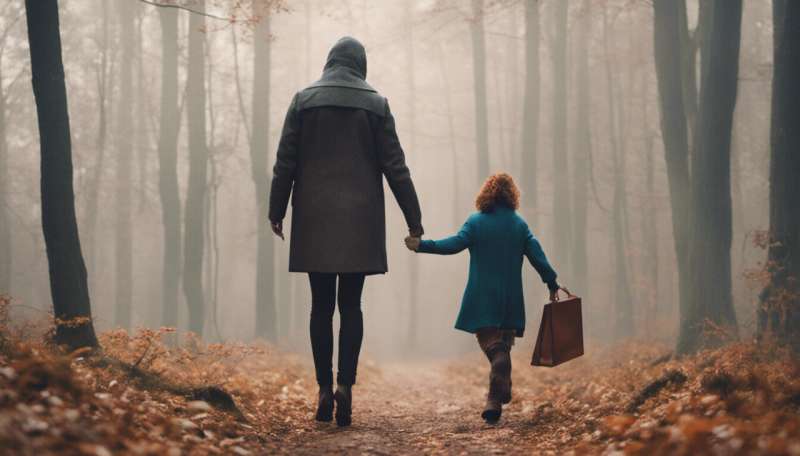'We're her real mum': Lesbian parents face healthcare challenges

Over the last few decades, legal reform and evolving attitudes towards LGBTQ+ people have significantly changed family demographics in the UK. Prior to 2005, children in England could not be adopted by people in a relationship who officially identified as being gay or lesbian. In 2021, one in six children placed for adoption in England were adopted by same-sex parents.
While it may be easier for same-sex couples to become adoptive parents, they and their children still face many barriers, particularly in the realm of healthcare. As a researcher in children's nursing, I am interested in how health services can be improved to help the most vulnerable. Adopted children are more likely than other children to access healthcare, often because of hereditary health issues and the long-term effects of abuse.
I interviewed six lesbian parents to learn about their experiences accessing healthcare for their adopted children in England. While this is a small sample size, the detailed experiences they shared are a valuable contribution to our understanding of the unique challenges faced by these families. These challenges can be different from those faced by heterosexual and biological families, fuelled by a combination of discrimination and lack of understanding by healthcare professionals.
Healthcare is often built on the assumption that the people accessing services are heterosexual. This includes, for example, the assumptions made when doctors ask about a spouse, or the whereabouts of a patient's father.
Lesbians have to "out" themselves in order to be recognized as a parent, and so their female partner can be brought into discussions about the childs' healthcare. This can lead them to feeling unaccepted as coparents:
"In an ideal world, people would just automatically read two women with a child or children as both their mums but we're [as a society] nowhere near that point yet."
Expectations of heterosexuality also mean that lesbian parents do not feel their family is understood or recognized by the healthcare system.
"People expect one of us to be 'the parent' … to have a more traditional family with "who plays mum and who plays dad," and not be equal partners in parenting."
Understanding families
Adopted children are more likely than biological children to have additional healthcare needs, learning disabilities, developmental delay or mental health challenges. It is important that healthcare professionals have an understanding of the adoption process and parental responsibility of adopted children. As one interviewee told me:
"We had to go to the health check and she [healthcare professional] said 'what about her real mum?" and it's like … we're her real mum."
In cases like this, the use of term "real" could create uncertainty or emotional distress for children. For a child who has endured plenty of uncertainty in their life, if their birth parent is described as "real" they may then ascribe "not real" or "pretend" to their adoptive parent.
Some parents also felt that their identity as lesbians and as adoptive parents led to being treated differently. This phenomenon, where different aspects of an individual's identity combined leads to a higher likelihood of encountering prejudice and discrimination, is common in the LGBTQ+ community.
Inclusive imagery and language
The parents I spoke with suggested that, while same-sex parents are more accepted in society, there is a long way to go before their experiences are reflected in everyday life. One way this can be done is in the language and images used on forms, posters and brochures produced by the NHS, which commonly feature heterosexual couples.
"We had to register him [child] at reception [primary care setting] and it [the form] had the usual … mums name … dads name. So we crossed out dad and just put mum."
Participants also said they encountered health professionals who did not understand the process of adoption and the health needs of adopted children. This caused them to feel anxious and agitated, as they felt like their children's treatment was delayed due to a lack of adoption competence.
Not all interactions were negative, and some parents described experiences that helped them feel validated as a family:
"He said "There's the two mums I've been looking for. Shall we walk and talk?" … It was very normal and he's always been inclusive and great with the kids. I think he's helped restore [the children's] faith in healthcare."
There was this anesthetist who was lovely … he never asked [who was her mum] and he obviously had read the notes or talked to somebody, or had just worked out the situation himself, acknowledging both of us all of the time. He explained stuff to us as if we were both parents, which it shouldn't really be a novelty, but it was.
Lesbian parents have to tread a complex path in healthcare, and sometimes feel they have to educate practitioners about being same-sex adoptive parents. While society is theoretically more inclusive than ever, lesbian parents and their adopted children won't be fully "seen" until healthcare becomes a more accepting and safe space.
Provided by The Conversation
This article is republished from The Conversation under a Creative Commons license. Read the original article.![]()















